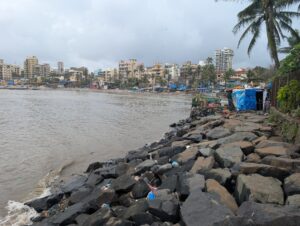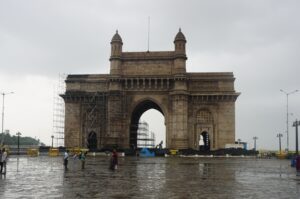Nala Sopara
Two Church Congregations & a Family Meal
I decided on Sunday I would try out the other hostel in my neighborhood. I carried all of my things with me to church on Sunday. Princeton Palmer had put me in touch with Richard Michael, a resident of a north Mumbai suburb who was active in support of several local congregations. He was planning on attending two services Sunday, an English service at 9:30, and a Hindi service at 3:00 in an even more northerly location.
The English language service was a house church with just a handful of members in attendance. Several more rang in Skype-style from further away. Like many church congregations around the world, they were dealt a blow by the Covid-19 pandemic. They seem never to have fully recovered from their shift to primarily worshiping online. Richard has tried to help them along. As far as online services go, they do the best they can to draw in participation. The remote parishioners often lead songs and prayers or read scripture. It seems to be working for them, though I doubt any of them would say that it is a full substitute for in-person worship. They are making the most of their situation, and it works. As the text says, He is present when two or three are gathered in His name.
There were closer to ten of us with me and Richard’s family there. Afterward, we enjoyed a late breakfast at a local eatery. We ate some kind of thin pancakes with savory dips and toppings. We then spent some time at Richard’s house, awaiting our departure for the 3:00 p.m. service. Richard lives in a small, two bedroom ground floor flat. It is clean, and I think inexpensive due to it’s location in the far north of the Mumbai suburbs. Mumbai has a reputation for having some expensive real estate, though I have no context to understand whether it is expensive compared to American or European real estate, or just expensive relative to the market in India.
As with homes anywhere in Asia, we took off our shoes. There was a room air conditioner in the living space, but it wasn’t on. Like the bathrooms in most hotels and hostels I visited in this part of the world, there was a shower with an inline heater not separated by partitions from the toilet, and a bidet for post toilet cleaning. The living areas were small, and laundry was hung to dry inside the house. Outside of America, it is rare to find a machine to dry clothes, and the monsoon rains prevent hanging laundry outside. I enjoyed visiting with the whole family. Richard shared his passionate views about the history of India and colonialism. His sixteen year old daughter Rachel offered insights from her academic course in film and Indian culture and family values. We talked about benevolence, economics, the traditional Indian family, religious influence on culture, and many other interesting topics.
We were a bit late to our afternoon service. We had been late to the morning service as well. Richard and his wife were quite apologetic about this. It seemed unavoidable, though. Traffic was a mess even on Sunday, and when there was a break in the traffic, road conditions prevented drivers from throwing caution to the wind with regard to speed. The roads around Mumbai are much, much better than those in places like Guatemala and Nepal, but not smooth enough to roll at West Texas highway speeds regardless of traffic.
The Hindi speaking congregation met in a school. They shared the space with a Pentecostal group, which is why the service was held in the afternoon. The classroom we used was completely full. I was asked to preach, but not until 20 minutes after the service began. I did not feel prepared for this, and so demurred this time. I did offer prayers, and I led a song once in the morning service.
Richard’s family prepared a home cooked meal for me after services. For them, it was an early supper. We ate at about 6:30. Supper time for them is apparently closer to 8:00. This was the kind of experience I was so looking forward to when I allocated a week to Mumbai, thinking I would spend the time in the home of a local family. The meal was excellent, of course, and the experience was different and eye opening. This was my introduction to traditional Indian hospitality and family roles.
I found myself repeating the mantra F.L.A.G. often uses when coaching new host families through cultural differences they see in their students, “It’s not better, it’s not worse, it’s just different.” Traditional Indian family hospitality honestly made me feel a bit uncomfortable at times. My generous hosts brought out a multi-course meal, but only Richard and I enjoyed it. Of course, I expected us to sit down together and share a meal and more hearty discussions and stories. Instead, the ladies brought the meal courses in one at a time and served them to Richard and I like we were maharajahs. I was not allowed even to sweep rice or scoop masala onto my own plate.
“Edith, serve me some more rice,” Richard said to his wife. The girls stood nearby and watched us eat. Perhaps rudely, I at least once asked if they could join us to share the meal. This was not rebuffed outright, but a soft excuse was given as to why this didn’t need to be done – a slightly elusive answer. Feelings of chivalry instilled in me from my culture made me twist a bit in my chair. Here were these ladies, who had opened their home and prepared this meal for me, not even being allowed to share in it. I had expressed my desire to share it as best I could. I decided to enjoy the gift of the hospitality and meal rather than questioning its appropriateness from a cultural perspective.
There was one other cultural norm I had to overcome. From the time I was a small child, I have always been encouraged to “clean my plate.” I have a deep personal aversion to waste – one that will compel me to eat past when I am hungry rather than throw away scraps. I eventually figured out that if I did not leave at least some portion of food on my plate, the meal would never end. When my plate got below half full, Avril and Edith were right there ready to scoop and sweep, and would not really take no for an answer.
My meal concluded with a slightly sweet, rice based dessert that I enjoyed thought it almost didn’t taste like a dessert to a Western palate. I also came away wondering how deeply this sort of family gender role structure was embedded in Indian culture and hospitality. I have read and been told that Indian values were rapidly changing, with many ideas of what is appropriate within families going by the wayside. I had no context, though. This was my only experience eating an Indian family meal. Was this the norm, or a case of extreme traditionalism? I didn’t know, but got a few clues that you will learn about later.
Richard and his family got me back to the bus, where they insisted on buying me a first class ticket for the one hour trip back to Bandra. Indian trains are interesting. In this case, it was difficult to tell much difference between the first class and standard train cars, other than that first class was not “standing room only,” and the rest of the train was. The cost difference is small, however, and paying for a higher class ticket seems to often buy personal space if nothing else, since the very small difference in ticket prices quickly thins out who can and will pay the additional fare.
The train station was quite a bit farther from my new hostel than the bus. I caught a rickshaw, and arrived at about half past ten. The new hostel was smaller, but cleaner and more comfortable. There were many more talkative travelers, and the bed was long enough I didn’t have to sleep diagonally. Best of all, as I would learn the next morning, they served an awesome hot, home cooked breakfast every morning that was included with the price of the bed.







